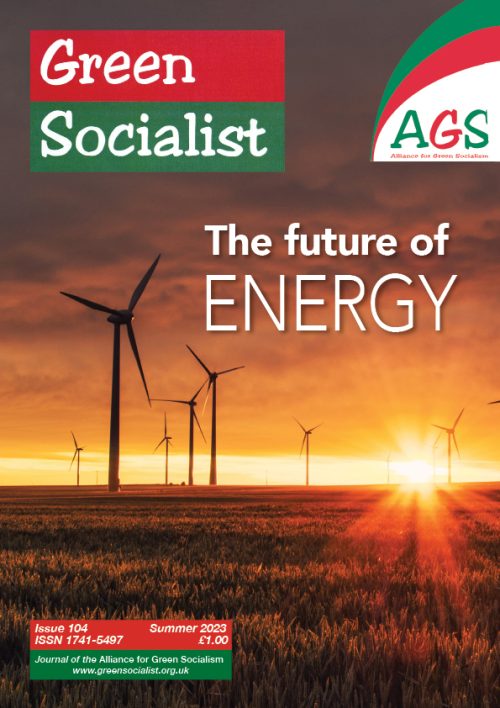By Mike Davies
Modern civilisation uses – and is dependent on – vast amounts of energy. Over the last couple of hundred years, we have shifted from using energy for heavy industry to relying on the ready availability of huge amounts for convenience and leisure.
One consequence has been global heating caused by the ‘exhaust’ gases, such as carbon dioxide and methane, generated by burning coal, oil and gas as fuel and from biological sources like farm animals. Fifty years ago the greenhouse effect was a theory increasingly accepted by scientists and with potentially serious consequences. Today we can see its effects in wildfires, drought, hurricanes and floods. Shortages of food and clean water follow as night follows day. We no longer need to be warned about the possibility of global heating, the world is experiencing its early stages.
Yet what we can see now is only the very beginning. Our civilisation will clearly not withstand the consequences of our own actions. At the most elementary level, we will see hundreds of millions of people become refugees as their land is inundated. Bangladesh alone will see 170 million displaced people as it all but disappears beneath the waves. The melting of the Greenland ice-cap alone will suffice to drown the country.
The primary cause of global heating is humanity’s profligate and ever increasing demand for energy. The greedy level of consumption, especially in the more affluent West, requires ever increasing energy. Yet the policy of our government (indeed, the automatic international consensus) is still growth, growth and more growth. It is as though our leaders – political and economic – cannot see, let alone read and understand.
We can no longer sustain our increasing consumption of energy. We must reduce, rather than increase, our demands. Only that can give us a chance of avoiding collapse.
SOURCES OF ENERGY
Even if we reduce our current unnecessary levels of energy consumption, we will still need significant amounts of energy. Clearly we cannot continue to source it by burning fossil fuel. Nuclear power would condemn our children to a future struggling to deal with a poisonous legacy of waste with a half-life of 10,000 years. Just as clearly, we must limit the creation of methane from animal farming.
So what less harmful sources of energy exist? We must look to harness energy sources that are, to all intents and purposes, renewable. One set of such sources derives directly or indirectly from the sun: solar water heating, photo-voltaic electricity, hydroelectricity.
Another is primarily from the Earth and its motion: geothermal, tides, ocean currents. And more from a combination of sun and Earth: wind and wave power.
Some – but by no means all – of these sources of energy are subject to the problem of intermittent and/or local supply. The sun does not always shine brightly, even on the righteous. Tidal races may be a long way from where the energy is needed. But we have been dealing successfully, for decades, with the problems of intermittent and/or localised demand. Some of the same tools can be applied to intermittent and localised supply.
Two major ones are networking and storage. The sun does always shine – somewhere. If we network our power sources we can mitigate the fact that not all provide energy all of the time. Similarly, the wind does always blow – somewhere. And, of course, many renewables are constant or predictable . Geo-thermal is always on. The tides always rise and fall.
Energy storage also provides mitigation and has done for ages. Simple approaches include pumping water up to higher ground at times of low demand and running it down through turbines when needed. (It can be pumped to a higher reservoir or lake, or just up a water tower.) It can be – and already is – used to generate electricity and stored in conventional lead/acid batteries. It can also be stored in more sophisticated batteries such as lithium-ion. Or in capacitors. Alternatively energy can be used to generate heat which is stored in salt or other mineral depositories.
We need to store energy on a massive scale to use later. We also need to store it in transportable form to power transport, including cars. Such storage is not without problems. Indeed, turbine-based generation of electricity shares some of these.
The ‘cleverer’ technologies for both generation and storage of electricity tend to rely on rare earths, such as lithium and cobalt, minerals which are in fairly short supply. The supply chain for such often starts with their mining in dreadful conditions for poverty wages.
Of course, that is true of any number of the raw materials our capitalist society uses. The prosperity of Britain and most of the west was built, over the last couple of centuries, on ruthless exploitation of labour in poorer countries. The kind of less greedy, more co-operative society we advocate would be less hungry for energy and more concerned about equitable relationships with other countries and their people.
In the particular case of energy, the first part of the answer is, as stated above, to reduce our unsustainably high demand for it, and therefore for the raw materials it consumes. The classic example of how to do this is to stop subsidising cars and their infrastructure.
Instead we should provide pervasive, comprehensive and affordable (or free) public transport. We have had over a century of treating car as king, with cities, towns, villages and long-distance links built around it. Let us become a country that does not assume that everyone has a car but instead assumes that most journeys can be made by bus or train.
Mike Davies is Chair of the AGS
Photo by Karsten Würth/Unsplash

